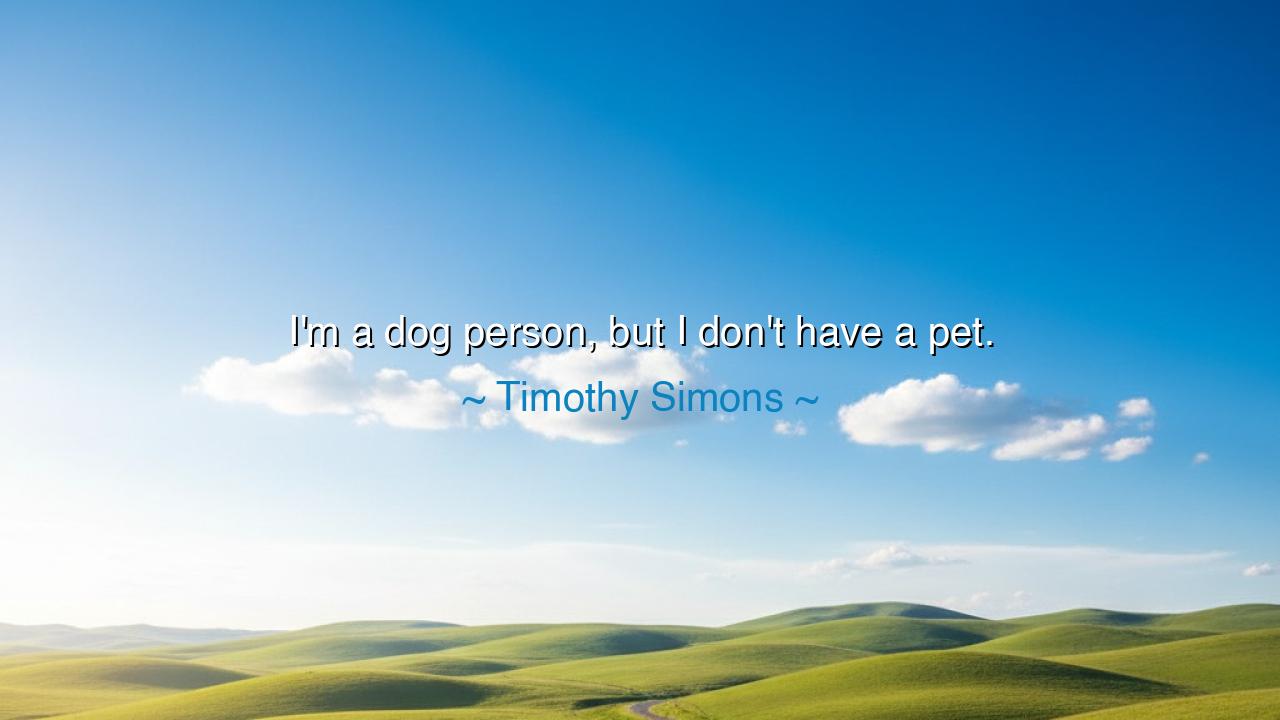
I'm a dog person, but I don't have a pet.






Timothy Simons once uttered the words: “I’m a dog person, but I don’t have a pet.” At first glance, it seems a light and passing remark, but hidden within it is a paradox that reflects the struggle of human hearts. For to be a dog person is to profess loyalty, affection, and kinship with creatures of faithfulness and joy. Yet to not have a pet is to confess absence, distance, or perhaps restraint. Within these words, the ancient tension emerges: between desire and action, between identity and circumstance, between the love we declare and the life we actually live.
The ancients would have known this paradox well. They taught that man is often divided between what he values in the soul and what he manifests in the world. To claim the heart of a dog person is to align oneself with loyalty, companionship, and the virtues of steadfastness that dogs symbolize. But to live without such a companion reveals that sometimes the spirit’s longing is restrained by duty, limitation, or wisdom. Not every yearning of the heart can be grasped; not every affection can be housed. Thus, the saying becomes not trivial, but a mirror for the human condition.
History gives us examples of this same tension. Consider the emperor Marcus Aurelius. He was a philosopher at heart, yearning for solitude, for the quiet life of contemplation. Yet his station demanded that he be a soldier, a statesman, a judge. His soul was one thing, his outward life another. He, too, could have said, “I am a lover of peace, but I dwell in war.” So too Timothy Simons’ words remind us that identity is not always reflected in possession or circumstance. We may be shaped by what we love, even if we cannot hold it in our hands.
In the deeper sense, the dog stands as a symbol of loyalty, trust, and simple joy. To call oneself a dog person is to recognize the value of these traits. Yet, the absence of a pet is not necessarily a contradiction; it may be a form of humility. For to have a pet is not merely to receive joy, but also to shoulder responsibility—the care, the time, the devotion it requires. Perhaps restraint in such matters is itself wisdom: to honor the bond without taking it lightly, to respect the creature enough not to embrace it unprepared. In this way, the paradox dissolves into integrity.
We learn here the lesson of alignment between desire and responsibility. It is not enough to love an idea; one must also be prepared for its weight. Many declare their passion for justice but fail to labor for it. Many profess their belief in truth but hesitate when lies offer comfort. Likewise, many call themselves lovers of animals, but to truly honor such a bond demands sacrifice. To be a dog person without a dog may, in some cases, be honesty itself: a recognition that the heart is ready in affection but not yet in stewardship.
In practice, this wisdom teaches us to examine our own lives. Where do we call ourselves one thing, yet live another? Where do we long for a bond, but lack the will to sustain it? Rather than condemning ourselves for inconsistency, we may use these paradoxes to grow. If you are a dog person without a pet, tend to the loyalty, joy, and love within you by offering it to others—friends, family, even strangers. If your soul loves peace but your life is filled with conflict, then carry peace within and let it guide your actions in small ways.
Thus, dear traveler of life, Simons’ words are not contradiction but invitation. They remind us that identity begins within, not without. To be a dog person is not only to hold a leash, but to embody loyalty, to live with playfulness, to walk faithfully beside those we love. Even without a pet, such a spirit shines forth. And when the time is right, when responsibility and desire meet as one, then the bond may be fulfilled in flesh and fur. Until then, let the heart be true, for what we carry within is always greater than what we possess without.






AAdministratorAdministrator
Welcome, honored guests. Please leave a comment, we will respond soon